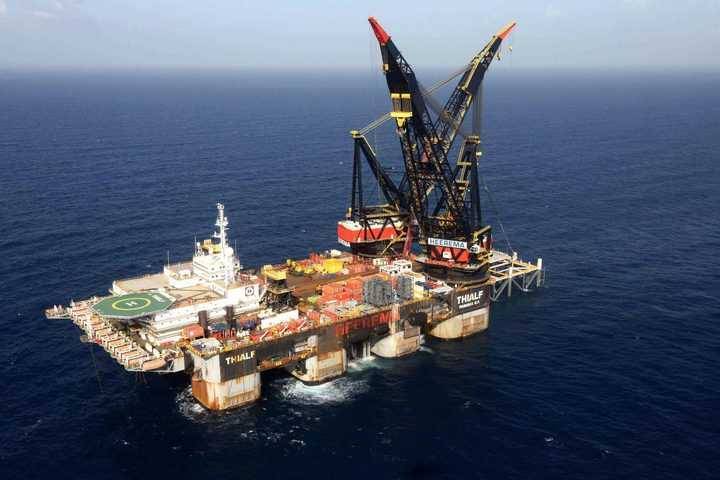Information revealed to "Al-Jumhuriya" indicates that on October 22, Total handed over Block 4 to the Lebanese state after it became apparent during a previous phase that there was no gas present in it. While it was expected that the company would re-drill in the same block but from a different point, it opted to return it to the Lebanese state, which now reintegrates it into the blocks available for exploration.
Recently, Israel awarded six blocks to a consortium of companies that includes the Italian company Eni, which had previously entered into a partnership with a consortium to drill in blocks 4 and 9 in Lebanon. Furthermore, it advanced to participate in the second licensing round to award blocks 8 and 10 in partnership with Total and Qatar Energy. The question arises: could this step threaten this alliance? Will there be acceptance of continuing cooperation with a company that operates concurrently with both Lebanon and Israel?
In this context, sources in the Petroleum Sector Management Authority clarified to "Al-Jumhuriya" that the Israeli side was seeking to award four areas, and on the previous day, a consortium was selected for area G, which is located at the border with Egypt, to be managed by Eni, which is currently drilling in the Zohr field in Egypt. This justifies its choice for exploring this area.
Regarding the recent awards made by Israel, the consortium for area I includes the companies SOCAR (operator), BP, and NewMed Energy, which will commence exploration in the blocks adjacent to Lebanese block 8. When asked if Eni's simultaneous work with Lebanon and Israel would pose a problem and threaten the award of the second licensing round in which Eni is a participant, the sources excluded that scenario and asserted that it should not have any impact on the alliances, especially since Eni will operate at the border with Egypt. The sources also questioned whether American companies Chevron or Exxon would be barred from working in Lebanon; they stated, "What we seek is to attract global companies to work in Lebanon." They reassured that there is no danger of dismantling the consortium of companies that applied to work in blocks 8 and 10, which includes Eni.
Regarding the next phase, particularly after the announcement about the results of block 9, the sources confirmed that the issue of oil exploration has been postponed until 2025. As for block 9, we are waiting for the final drilling results report from Total, based on which the company will decide whether it intends to resume drilling in this block again, which will not occur before 2025. As for the second licensing round for blocks 8 and 10, the Petroleum Sector Management Authority is currently reviewing the technical and financial offer submitted by the Total, Eni, and Qatar Energy consortium. Subsequently, it will negotiate with this consortium and agree on which blocks will be licensed, whether only block 8, only block 10, or both together, noting that there is a tendency towards the third option as it reflects interest in Lebanese offshore. The sources explained that this process will also take time, indicating that if drilling happens, it will not be before 2025.
Additionally, the sources stressed the need to maintain pressure on Total to resume drilling in block 9 as soon as possible and to launch the third licensing round, which should include blocks 1 to 7, while marketing for oil exploration in Lebanon to global companies. It is disappointing that both Eni and DP collaborate with Israel while global companies show little interest in Lebanon. Therefore, it is essential to attract the attention of foreign companies, especially European ones, particularly since we are in competition with the region to place Lebanon on the global oil map. This should be accompanied by efforts to facilitate investment for companies to encourage their entry into the Lebanese market.
The sources believed that excessive expectations and sensational headlines have hurt Lebanon more than benefited it, particularly the "conspiracy theory" that drives global companies away and undermines their credibility, making it less likely for them to be motivated to work in Lebanon again.
**Block 4 Returns to the State**
On another note, information shared with "Al-Jumhuriya" revealed that the Lebanese state received Block 4 from Total on October 22, which had previously drilled in it in 2020, confirming that there was no commercially viable gas present. Although hopes were high that the company would return to drill in it from a different site, it seems that the studies conducted by Total deemed it economically unviable. Hence, the block was returned to the state to join the group of blocks available for exploration.
In this context, in response to proponents of the "conspiracy theory," the sources questioned if the theory were true, would Total have handed Block 4 back to the state? If there was commercially viable gas in this block, would they not have retained it? Regarding concerns that Block 9 might meet the same fate as Block 4 and be returned to the state, the sources confirmed that it is still premature to discuss the fate of Block 9, pending the completion of geological studies of the area, its reservoir features, and subsurface formations, which are expected to be presented in a report from Total within 4 to 5 months. The sources added, "The information available about Block 9 is very rich, and there is great geological clarity about the surrounding blocks; therefore, it is unlikely that Block 9 will share the same fate as Block 4 due to significant differences in the nature of the areas."




